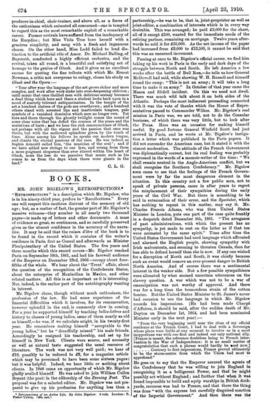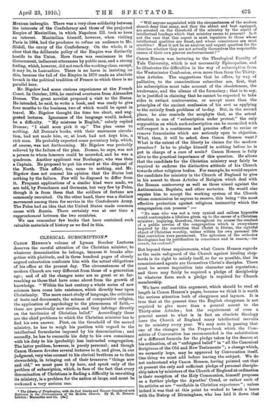BOOKS.
MR. JOHN BIGELOW'S RETROSPECTIONS.*
" RETROSPECTIONS " is a description which Mr. Bigelow, who is in his ninety-third year, prefers to " Recollections." Every one will respect this cautious distrust of the memory of old age ; but, as a matter of fact, the greater part of Mr. Bigelow's massive volumes—they number in all nearly two thousand pages—is made up of letters and other documents. A mass of evidence so great, so continuous, and so carefully preserved gives us the utmost confidence in the accuracy of the narra- tive. It may be said that the raison d'gtre of the book is to be found in the record which it contains of the writer's residence in Paris, first as Consul and afterwards as Minister Plenipotentiary of the United States. The five years and three months which this record covers—Mr. Bigelow reached Paris on September 18th, 1861, and had his farewell audience of the Emperor on December 23rd, 1866—occupy about four- fifths of the whole. We hear about the ' Trent' affair, about the question of the recognition of the Confederate States, about the enterprise of Maximilian in Mexico, and other related matters. All this is as important as it is interesting. Nor, indeed, is the earlier part of the autobiography wanting in interest.
Mr. Bigelow chose, though without much enthusiasm, the profession of the law. He had some experience of the financial difficulties which it involves, for its remuneration, however splendid in the end, is commonly slow in coming. For a year he supported himself by teaching belles-lettres and history to classes of young ladies, some of them nearly as old as himself,—he was, if we calculate aright, in his twenty-first year. He remembers making himself " acceptable to the young ladies," but he " dreadfully missed" his male friends. Accordingly be resigned his teachership, and set up for himself in New York. Clients were scarce, and necessity as- well as natural taste suggested the usual resource of literature. The work was not very well paid ; we hear of £10, possibly to be reduced to £8, for a magazine article which may be presumed to have been some sixteen pages ; but it was -helpful. Indeed, we hear little or nothing about clients. In 1848 came an opportunity of which Mr. Bigelow gladly availed himself. He was asked to join William Cullen Bryant (the poet) in the editorship of the Evening Post. The proposal was for a salaried editor. Mr. Bigelow was not pre- pared to give up his profession for anything less than a
•
M
Botroopounotionn s of, an n Active Life. By John Bigelow. vole. London: T. 'Fisher . r 413eet.1
partnership,—he was to be, that is, joint-proprietor as well as joint-editor, a combination of interests which is in every way desirable. This was arranged; be paid £3,000 for the share, all of it except £500, wanted for the immediate needs of the retiring partner, remaining on mortgage. Twelve years after- wards he sold it for £35,000. As the net income of the paper had increased from £3,000 to £13,500, it cannot be said that this was an unearned increment.
Passing at once to Mr. Bigelow's official career, we find him taking up his work in Paris in the early and dark days of the struggle between North and South. He left America a few weeks after the battle of Bull Run,—he tells us how General McDowell had said, while showing W. H. Russell and himself round the camp : " This is not an army; it will take a long time to make it an army." In October of that year came the Mason and Slidell incident. On this we need not dwell. There was much wild talk about it on both sides of the Atlantic. Perhaps the most indiscreet proceeding connected with it was the vote of thanks which the House of Repre- sentatives passed to Commander Wilkes. Mr. Bigelow's real mission in Paris was, we are told, not to do the Consular business, of which there was very little, but to look after the Press. Here was an occasion for making himself useful. By good fortune General Winfield Scott had just arrived in Paris, and he wrote at Mr. 'Bigelow's instiga- tion a letter which was published in the Paris papers. It did not surrender the American case, but it stated it with the utmost moderation. The attitude of the French Government was diplomatically correct, but its real feeling was probably
expressed in the words of a memoir-writer of the time : " We shall remain neutral in the Anglo-American conflict, but we shall recognise the Southern Confederacy." Mr. Bigelow soon came to see that the feelings of the French Govern- ment were by far the most dangerous element in the situation. In this country not a few public men, not to speak of private persons, came in after years to regret the misplacement of their sympathies during the early years of the Civil War. But there is something to be said in extenuation of their error, and the Spectator, which has nothing to repent in this matter, may say it. Mr.
Charles Francis Adams, who was then United States Minister in London, puts one part of the case quite frankly in a despatch dated December 6th, 1861. " The arrogance of past administrations, with which the present has no
sympathy, is yet made to rest on the latter as if that too were animated by the same spirit." Time after time the United States Government had used language which affronted and alarmed the English people, showing sympathy with Irish malcontents, and seeming to threaten Canada, then far less able to defend herself than she is now. If any one wished for a disruption of North and South, it was chiefly because such an event would remove an ever-present danger to British North America. And of course there was a sentimental interest in the weaker side. Not a few possible sympathisers were alienated by what seemed uncertain utterances on the slavery question. A war which was not to be a war of emancipation was not worthy of approval. And there was for a long time the tremendous strain of the cotton famine. But the United States Minister to St. James's never had occasion to use the language in which Mr. Bigelow records his impressions. (He had been made Chargé d'Affaires, it should be said, after the sudden death of Mr. Dayton on December 1st, 1864, and had been nominated Minister early in the next year):—
" From the very beginning until near the close of my official residence at the French Court, I had to deal with a Sovereign whose plans were liable at any moment to involve us in a most inopportune war with our first and indeed our only national ally. [France is meant, the reference doubtless being to French inter- vention in the War of Independence: it is no small matter of congratulation that such a phrase would hardly be ased now.] . . . . . . Contrary to first impressions, France proved ultimately to be the storm-centre from which the Union had most to apprehend."
He goes on to Bay that the Emperor assured the agents of
the Confederacy that he was willing to join England in recognising 'it as a belligerent Power, and that:he might possibly act without England ; and further that when it was found impossible to build and equip warships in British dock- yards, recourse was had to France, and that there the thing was done "with the express but carefully disguised sanction of the Imperial Government." And then there was the
Mexican imbroglio. There was a very close solidarity between the interests of the Confederacy and those of the projected Empire of Maximilian, in which Napoleon III. took so keen an interest. Maximilian himself, however, when visiting Paris in 1864, had the prudence to refuse an audience to Mr. Slidell, the envoy of the Confederacy. On the whole, it is clear that the deliberate policy of the Empire was distinctly hostile to the Union. Here there was remissness in the Government, indiscreet utterances by public men, and a strong feeling, which, however, did not reach the working class, except, it may be, in Lancashire. There is no harm in insisting on this, because the fall of the Empire in 1870 made an absolute breach in the political tradition of France to which there is no parallel here.
Mr. Bigelow had some curious experiences at the French Court. In October, 1864, he received overtures from Alexandre Dumas. The great novelist proposed a visit to the States. He intended, he said, to write a book, and was ready to give four months to the business, two of which would be spent in travel. Mr. Bigelow thought the time too short, and sug- gested lectures. Ignorance of the language would, indeed, be a difficulty. " My mistress is English," calmly replied Dumas; "I shall soon pick it up." The plan came to nothing. All Dumas's books, with their enormous circula- tion, had not made him, or, at least, had not kept him, a rich man. He probably expected some pecuniary help, which, of course, was not forthcoming. Mr. Bigelow was probably relieved by the failure of the plan. Dumas, he says, was not a person to whom honours could be accorded, and he was a quadroon. Another applicant was Boulanger, who was then a Captain. He proposed to put his sword at the disposal of the North. This affair, too, came to nothing, and Mr. Bigelow does not conceal his opinion that the States lost nothing by the failure. Few will be disposed to differ from it. Frequent applications of a similar kind were made, we are told, by Frenchmen and Germans, but very few by Poles, though it is from them that the soldiers of fortune are commonly recruited. On the other hand, there was a distinct movement among them for service in the Confederate Army. The Poles had an idea that the United States made common cause with Russia. There certainly was at one time a rapprochement between the two countries.
We can remember few books that have contained such valuable materials of history as we find in this.















































 Previous page
Previous page